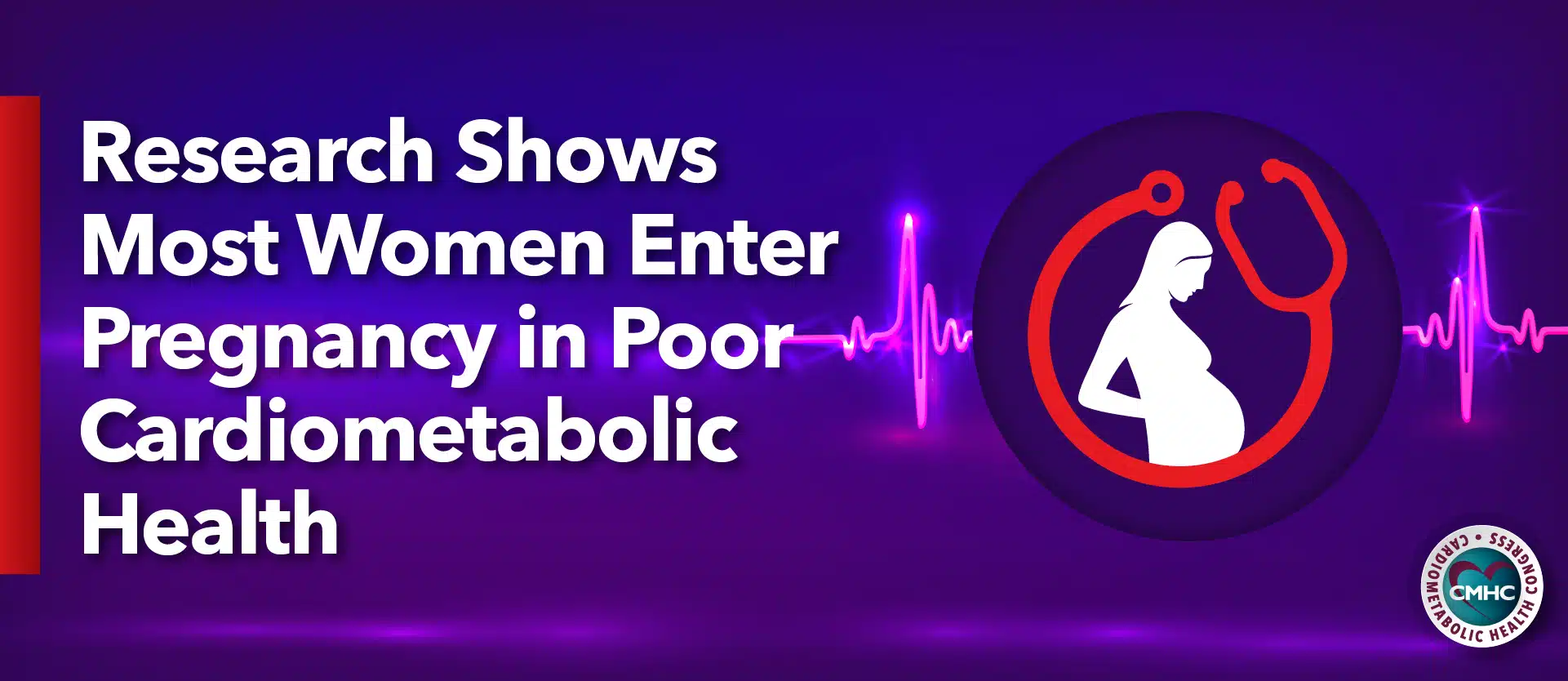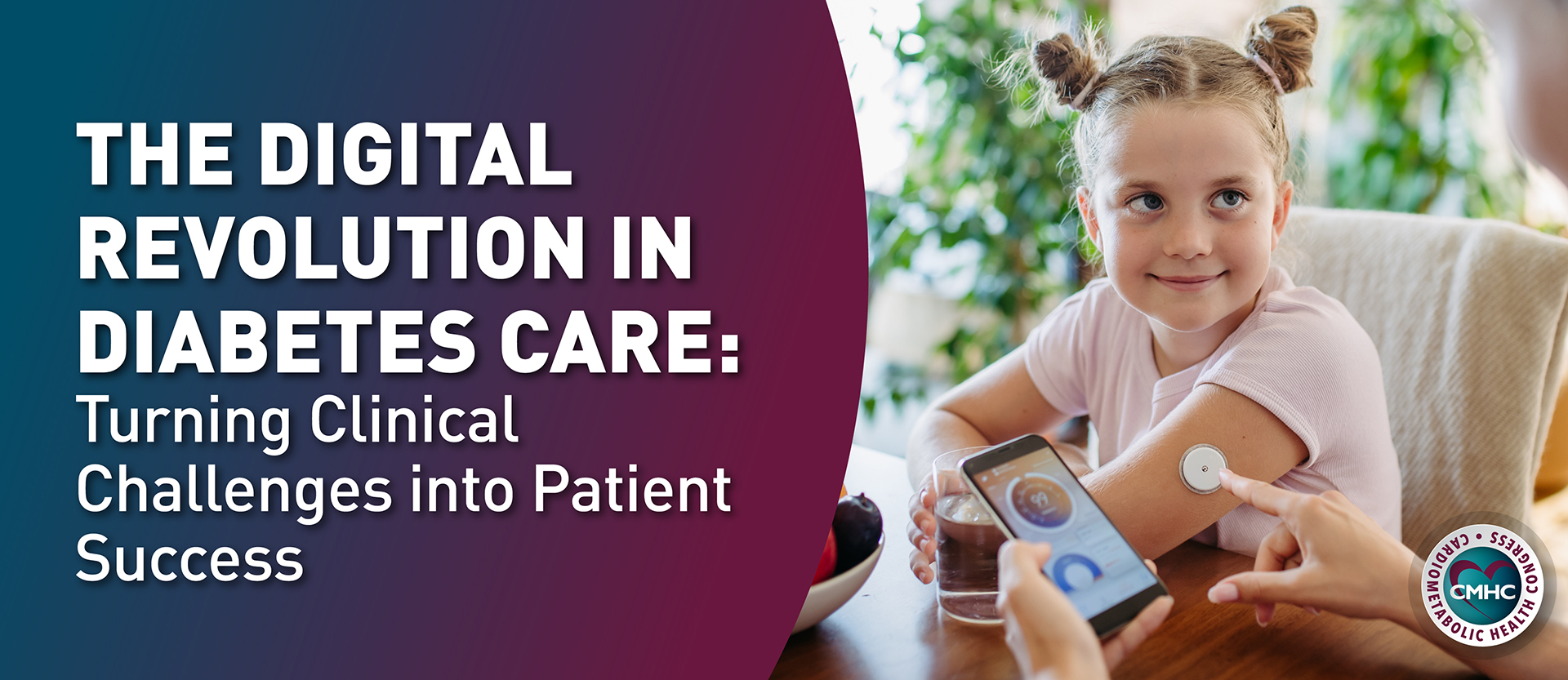Obstetricians call pregnancy a “stress test” for a woman’s body. The increased blood volume puts extra burden on a woman’s circulatory and cardiovascular systems, and the surge of pregnancy hormones can test the endocrine system, specifically the insulin-sensitivity of the pancreas. When pregnant women develop conditions like gestational hypertension, gestational diabetes, preeclampsia, or gain more weight than is recommended, the likelihood of complications during pregnancy and delivery (for both mother and baby) increases. The chances of premature birth, low birth weight, and the need for neonatal intensive care for their newborns is significantly higher. Besides having their babies early or small for their gestational age, the effects of poor maternal health during pregnancy can affect the overall health of children for their lifetimes. The mothers, too, can experience the impact of having these pregnancy-related risk factors years later.
Cardiometabolic complications in pregnancy can lead to negative health outcomes for both mothers and infants.
Even when healthy women enter their pregnancies with no known risk factors, many go on to develop one or more gestational cardiometabolic condition. As women who’ve given birth and their providers know, many of these conditions either do not resolve postpartum, or temporarily resolve just to return in some form later in their lifespans. But, alarming new findings from a retrospective study show that more than half of women in the U.S. already have obesity, hypertension, or diabetes when they begin their first pregnancies. Unsurprisingly, these women have higher-risk pregnancies with poorer maternal and fetal outcomes, and much higher rates of mortality. Cardiovascular disease and diabetes can be a serious concern for women who have had an unhealthy cardiometabolic profile before becoming pregnant or developing any of these problems during their pregnancy. According to the American Heart Association, 1 in 4 pregnancy-related deaths is caused by heart disease. Experts agree that healthy lifestyle habits before and during pregnancy result decreased risk of maternal death, but education and implementation of those lifestyle habits are where the authorities begin to dissent.
“Entering pregnancy with poor cardiometabolic health increases your risk of adverse pregnancy outcomes, and adverse pregnancy outcomes are considered a risk-enhancing factor for cardiovascular disease later in life.”
Natalie A. Cameron, M.D., from the Northwestern University Feinberg School of Medicine in Chicago, and colleagues conducted a nationwide, serial cross-sectional analysis of maternal birth records from all live births sourced from the U.S. Centers for Disease Control and Prevention (CDC) Natality Database from 2016 to 2019. Overall cardiometabolic health was calculated for 14 million women ages 20-44. The standard for optimal was a body mass index (BMI) in normal range, and the absence of high blood pressure and diabetes. According to Dr. Cameron, “Just 40% of women entered pregnancy with a normal weight without diabetes and without hypertension.” The most common of those three heart health risk factors was being overweight or obese. The authors concluded that only about 42% of women ages 30 to 34 had good heart health, as did 37% of those ages 40 to 44.
The cluster of cardiovascular disease risk factors (high blood pressure, high cholesterol, and high blood sugar) and cardiometabolic conditions (prediabetes, type 2 diabetes, and obesity) increase a woman’s risk of heart attack or stroke at any point her lifespan, but the risk is higher as women age. As more women in the U.S. pursue higher education and have vital access to birth control and family-planning resources, they are delaying their first pregnancies into their mid- and late-thirties. The increasing age at which women are having children in the modern era begets the question: is prepregnancy health in decline, or is the increase we’re seeing in gestational cardiometabolic complications an expected ramification of the increasing maternal age?
For some women, pregnancy is when they begin regular health care visits, so they are not diagnosed with risks until after a pregnancy begins.
“Many women only begin having regular health care visits once they become pregnant. If women already have overweight or obesity, high blood pressure or diabetes prior to pregnancy, it is often not diagnosed until pregnancy. However, if identified prior to pregnancy, their health care clinician can help them manage and optimize these conditions before pregnancy,” said lead study author, Dr. Cameron. She points to two glaring factors that, had women been seeing a physician prior to pregnancy, likely would have been addressed sooner than at their first prenatal appointment:
- Sedentary lifestyle. Women’s lifestyle habits before and during pregnancy can impact the health of both mother and baby. Efforts to improve cardiometabolic health should begin before conception and continue throughout pregnancy. Research has demonstrated that sedentary lifestyles, poor nutrition, obesity, stress and anxiety, genetic predisposition, and chronic disease all affect cardiometabolic health during pregnancy.
- Obesity. Obesity (BMI of 30 or higher) and overweight (BMI between 25 and 30) contribute to the development of type 2 diabetes, increasing the chance of preeclampsia, congenital disabilities, and preterm delivery. Obesity increases the likelihood of complications in labor, cesarean delivery, stillbirth, low Apgar scores, and neonatal intensive care unit admissions.
“Even more surprising are the geographic differences we found,” said Dr. Cameron, referring to lower cardiometabolic health in Midwestern and Southern states. “At the low end, just 31% of pregnant women had good heart health in Mississippi, compared to nearly 50% in Utah. While women in the West and Northeast fared better, they still had plenty of room for improvement: In the West, just over 42% had good heart health and in the Northeast, just under 44%.”
“The reason for the geographical differences appears to be social determinants of health, including education, Medicaid enrollment, access to preventive care, ability to afford healthy foods and neighborhood characteristics, such as green space,” the researchers noted. “Women in this age group are generally not evaluated by preventive cardiologists and also are focusing on caring for their families and children. If cardiovascular health is suboptimal at baseline, it puts that mother at risk of immediate adverse outcomes.”
Don’t ask what women can do better. Ask what society can do better.
Diabetes, obesity, and cardiovascular disease disproportionately impact people from racial and ethnic minority populations, which are linked to poverty and systemic racism in the U.S. Pregnant women from Black, Hispanic, Asian, Pacific Islander, and Native American communities are more likely than white women to live in poverty. That means they’re less likely to have access to healthy food, to live in neighborhoods with green space and safe opportunities to exercise, and to have had health education regarding lifestyle risk factors and maternal health.
“Women can be proactive about their health by speaking to their doctors about cardiovascular risk factors prior to pregnancy, getting conditions under control, not smoking and maintaining a balanced diet and healthy weight.”
The above statement is an example of why things aren’t improving. If this continues to be the advice providers are giving to women, it is likely the numbers seen in the CDC study will continue climbing in the same trajectory. Why? Women living in poverty rarely have primary care doctors to “speak to about cardiovascular risk factors,” they often don’t have the luxury of planning their pregnancies, they are unlikely to have access to the foods required to maintain a balanced diet or have safe spaces to exercise for healthy weight, and so many other barriers that make this statement a heuristical impracticality.
Although a surface-level analysis of the current crisis may indicate that women should pay closer attention to their health and cardiovascular disease risk factors, or that providers should do a better job of addressing cardiometabolic health in primary care or prepregnancy counseling, the conversation around public health should focus on one keyword: PUBLIC. This means we need to stop asking what women or their providers must do improve, but instead ask what society can do to invest in their communities and to create, pass, and implement public health policies that support mothers and improve their access to care and resources before, during, and after pregnancy. Methods to increase cardiometabolic health education, create equitable access to care, and make prevention a part of the medical culture in the U.S. are all essential elements of the public health movement.
Key takeaway
The rising incidence of cardiometabolic diseases in the U.S. affects patients from all demographics, including women of childbearing age. The high rate of gestational complications is paramount to the public health discussion because of its far-reaching implications for both mother and child during pregnancy, childbirth, and the remainder of their lives. Stronger initiatives to reshape the conversation about women’s cardiometabolic health throughout the lifespan must be instituted, which is why Cardiometabolic Health Congress (CMHC) is hosting the Women’s Cardiometabolic Health and Wellness Masterclass at the Terranea Resort in Southern California this September 8-11, 2022. Providers who’d like to join the discussion and hear from experts on improving cardiometabolic outcomes for women across the lifespan are invited to register for the masterclass.


















